Unearth Your Radiant Grin with Our Advanced Dental Implant Alternatives

A Cutting-Edge Dental Establishment - Offering Prime-Quality, Patient-Centred Care with Empathy and Innovation

Premier Dental Implants, Assured to Enhance Your Grin
We extend reasonably priced dental implant services in Sydney, delivering a resilient remedy for voids left by missing teeth. Our esteemed practitioners employ superior-quality titanium dental implants to create a strong base by securely fastening the screw into the jawbone.
Leveraging the latest technology and techniques, our adept team carries out dental implant treatment. A wide variety of dental implants are at your disposal. Following the firm placement of these, an artificial tooth is affixed to the implant, impeccably occupying the void and mimicking natural teeth.
For cost-effective and efficient dental implant therapy, rely on our cadre of seasoned dental professionals.
SMILE GALLERY
Visualise the brilliant lustre of your grin post your dental implant procedure.
Sinus Lift Dental Implants
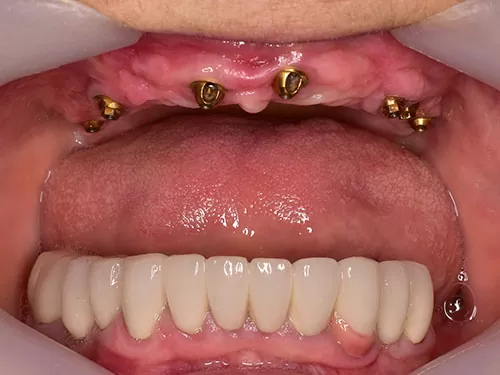
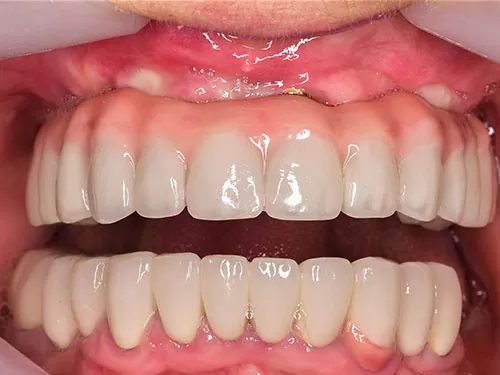
Procedure:
The patient’s treatment course began with a comprehensive assessment, followed by strategic planning for a sinus lift dental implant procedure. This approach is particularly suitable for patients who have insufficient bone height in their upper jaw or those whose sinuses are too close to the jaw for conventional teeth implants.
The expertise in performing the sinus lift and the precision during the subsequent dental implant surgeries were crucial to the successful outcome. The completion of this method, utilising advanced dental implant technology, ensured a solid foundation for the implants, restoring the patient’s smile and boosting their confidence.
Full Arch Dental Implants
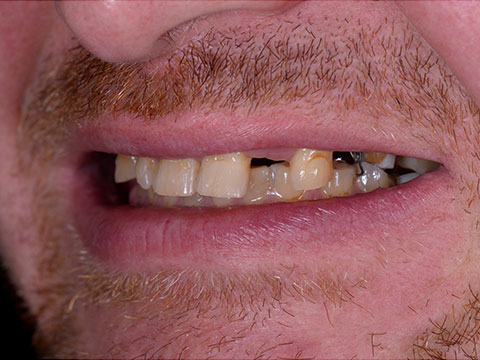
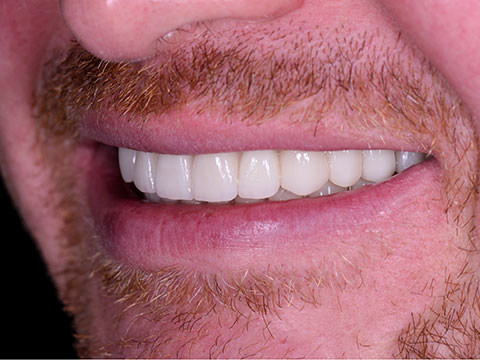
Procedure:
The initiation of the patient’s treatment involved a meticulous evaluation, succeeded by prudent planning for a full arch dental implant procedure. This procedure was designed for patients suffering from extensive tooth loss or gum disease, providing a comprehensive restoration solution.
The successful performance of this treatment depended heavily on the expert placement of the tooth implants, creating a full set of artificial teeth that imitate natural teeth. The final result was a transformative restoration, using digital dental implants that enhanced the aesthetic appeal and functionality of the patient’s mouth, significantly boosting their self-esteem.
Bone Grafting for Dental Implants
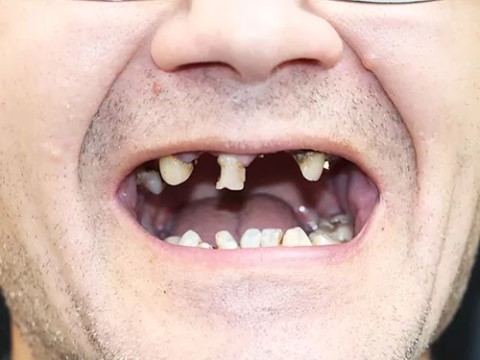

Procedure:
The commencement of the patient’s treatment started with a thorough review, then calculated planning for a bone grafting procedure prior to dental implants. This process was suitable for patients who lack adequate jawbone density to support conventional implants.
The outcome of this method was heavily reliant on the precision of the bone graft and the subsequent dental implants procedure. The end result was a robust foundation that enabled the placement of quality implants, contributing to a restored and natural-looking smile.
Note: Any surgical or invasive procedure carries risks. Before proceeding, you should seek a second opinion from an appropriately qualified health practitioner.
FAQ’s
With the advancement in technology and dental science, the success rate of dental implant surgeries has increased significantly over the years. However, like any surgical procedure, the risk of dental implant failure, though relatively low, is still present. To optimise the longevity and performance of your quality dental implants, it is crucial to follow certain preventative measures. Here are five essential strategies to reduce the risk of dental implant failure:
1. Prioritise Oral Hygiene
A significant factor contributing to dental implant failure is poor oral hygiene. Plaque and bacteria can accumulate around the implant site, potentially leading to infection and inflammation, conditions that may jeopardise the success of your implant. Therefore, maintaining good oral hygiene is paramount. Brush your teeth at least twice daily, floss around your implants to eliminate food debris, and consider using an antibacterial mouthwash. Regular professional cleanings can also be beneficial to maintain the health of your implant and surrounding natural teeth.
2. Avoid Smoking and Excessive Alcohol Consumption
Studies have consistently shown that smokers face a greater risk of dental implant failure compared to non-smokers. The harmful chemicals in tobacco interfere with the body’s healing process, affecting how effectively your jawbone can fuse with the implant. Likewise, excessive alcohol consumption can impair healing and lead to complications. If you’re planning to get dental implants, it’s advisable to quit smoking and limit alcohol intake to promote optimal healing and integration.
3. Regular Dental Check-ups
Regular dental check-ups are critical in the early detection and prevention of potential dental implant issues. Your dentist can monitor your implant health, along with your overall oral health, and address any minor concerns before they escalate. If there are signs of bone loss, inflammation, or movement of the implant, these can be addressed promptly, reducing the risk of failure.
4. Control Chronic Health Conditions
Certain systemic health conditions like diabetes or osteoporosis can negatively impact dental implant success. These conditions may interfere with the healing process and the ability of the implant to integrate with the bone. If you have a chronic health condition, it’s vital to work closely with your healthcare provider to manage it effectively. Maintaining a well-controlled status of such health issues can enhance your chances of successful implantation.
5. Use of Quality Dental Implants
Quality matters when it comes to dental implants. Higher quality implants are designed to better mimic the structure and function of natural teeth, leading to improved outcomes and lower failure rates. They are made from biocompatible materials (titanium or ceramic) that integrate well with the body’s tissues. Thus, ensure that your dental professional uses high-quality dental implants for your procedure.
By incorporating these strategies into your dental care routine, you can enjoy the full benefits of your implants and keep your smile healthy and bright for years to come.
When considering a dental implant procedure, one crucial aspect to weigh is the cost. Often, prospective patients wonder why there is such a range in the prices quoted for this treatment. The cost of tooth implants is not a one-size-fits-all figure; several factors can influence the final price. To make an informed decision, it’s necessary to understand the six primary components affecting dental implants cost.
1. Pre-Implant Procedures
Prior to the actual dental implant surgery, your dental professional might determine that you require preparatory procedures to ensure your implant success. These could include tooth extraction, bone grafts, or sinus lifts. Each of these procedures carries an additional cost, which can significantly influence the overall dental implant cost. If you require more extensive preparatory work, your implant procedure will likely cost more.
2. Number and Type of Dental Implants
Not surprisingly, the number of implants required will influence the overall cost. A single dental implant will be less costly than multiple implants. Moreover, the type of dental implant used also impacts the cost. Different types, sizes, and brands of dental implants vary in price. Higher-quality dental implants, while more expensive, are often more durable and have lower failure rates.
3. Implant Material
Dental implants are typically made from either titanium or zirconia, two materials known for their durability and biocompatibility. However, the choice of material can affect the dental implant cost. Titanium implants, being more commonly used, tend to be less costly compared to zirconia. Still, some patients may prefer or need to use zirconia due to individual circumstances or preferences.
4. Geographic Location
The region where you undergo the procedure can have a significant impact on the cost of dental implants. In areas with a higher cost of living, dental services, including implant procedures, are typically more expensive. This is due to higher overhead costs for the practice, such as rent and wages. Thus, your geographical location is a significant factor in the overall cost.
5. Dentist’s Experience
The expertise and experience of your dentist can influence the cost of your dental implants. A more experienced professional may charge more for their services, reflecting their skill level, training, and success rate with implant procedures. While you might be tempted to choose a cheaper option, it’s essential to consider the practitioner’s experience and success rates. Investing in an experienced professional can reduce the risk of complications, possibly saving you costs in the long run.
6. Ancillary Costs
Additional costs associated with the dental implant procedure may include the anaesthetic used during the surgery, post-op medications, and the cost of the implant crown or denture that will be placed onto the implant post. Furthermore, costs related to diagnostic procedures, such as X-rays or CT scans, also add to the total price.
The cost of dental implants involves more than just the implant itself. It’s a culmination of various components, all of which contribute to the total expenditure. It’s important to discuss these elements with your dental professional during your consultation to understand the total dental implant cost better and plan your finances accordingly.
When considering dental implant treatment, it’s essential to determine whether you are a viable contender for the procedure. Understanding the factors that make a person a good candidate can help you make an educated decision about whether this dental treatment is right for you.
The overall health of a patient is a crucial consideration when determining suitability for dental implants. Good candidates for dental implants are typically in good general health. Certain conditions, like uncontrolled diabetes, cancer, or periodontal (gum) disease, may affect the body’s ability to heal and integrate the tooth implant into the bone, potentially leading to implant failure. Moreover, lifestyle factors such as smoking can also impair healing and make the procedure less successful.
Aside from general health, your oral health status is also paramount in determining your suitability for dental implants. Good candidates have healthy gums and sufficient bone to anchor the implants in the jaw and commit to excellent oral hygiene. If you suffer from conditions like chronic gum disease or bone loss in the jaw, additional treatments may be necessary before you can be considered for dental implants.
Teeth implants require the same care as your natural teeth. This includes brushing twice daily, flossing daily, and making regular visits to your dentist. Even though dental implants are made from materials that don’t decay, the surrounding tissue can still become infected without proper care. Therefore, a strong commitment to good oral hygiene is essential for anyone considering this procedure.
Dental implants are usually recommended for adults whose jawbones have stopped growing. Hence, they are not typically used in children or young teenagers. However, older teenagers and adults of any age can be viable candidates for implants, provided they meet the other requirements for good general and oral health.
Obtaining dental implants is a comprehensive process that spans several months, involving various stages from consultation to the placement of the implant crown. This timeframe allows for the crucial process of osseointegration, where the jaw bone securely fuses with the implant for optimal stability and long-term success. Therefore, a willingness to commit to the process and to be patient is necessary.
LET US CREATE YOUR PERFECT SMILE
Fill out the form below, and we will contact you during our working hours.
